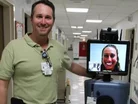Robotechnology forcing anesthesiologists out of a job, absorbing malpractice costs

I think we can all agree that if robotechnology is anything like Will Smith’s experience in I Robot, then I’m not sure how ready our public is for what robotechnology has to offer. Would you trust a robot, or better yet, a robodoctor with your life?
With the upcoming implementation of robotechnology in hospitals around the globe, more and more hospital workers are feeling the tension from these robodoctors taking away their patients and their jobs. The jury is still out concerning whether or not robots are qualified in making life-or-death medical decisions, an area where being human certainly helps when it comes to making split-second, life-saving decisions for a patient. Hospitals have been utilizing the robotechnology in low-stakes procedures like colonoscopies, using the robodoctors to administer anesthesia to patients. How do anesthesiologists feel about robodoctors doing their jobs? More importantly, how do we feel about robodoctors doing their jobs, regardless if the procedures are low-stakes or not?
“Another possibility is that this will work as well as, or better than, a doctor and replaces anesthesiologists -- not just for colonoscopies, but for more and more procedures. The health-care cost curve bends, and a bunch of doctors lose a very good living’, says Megan McArdle of the Huffington Post.
The ethical issue remains: who is accountable is a mistake is made by a robot during a surgical procedure? Administering anesthesia? Or worse?
Anesthesiology, which requires a huge amount of manual labor and on-point decision making skills, strikes me as something which robots don’t have. However, on the opposite end of the polarized debate, an anesthesiologist is not a necessary position; it drastically helps patient comfort, but does not impact the survival rate of the patient.
With all of the talk about the proponents of this technology and what good it can bring, the public questions the issue of malpractice, and how it will impact businesses mal practice costs. Some argue it the responsibility of the manufacturer of the robodoctor if the machine malfunctions and that they should absorb the costs, thus removing the expensive malpractice costs from hospital budgets. Others argue that it is the responsibility of the clinician overseeing the robodoctor who needs to step-up and assume responsibility, putting extra pressure and the cost back onto that hospital worker, now being responsible for someone else’s actions. Regardless of who the blame falls onto, how do patients feel about a robot being in control of their pain-level, or more importantly, their life?
Companies like Johnson & Johnson and Dignity Health are considering implementing the anesthesiology robodoctors and general robotechnology, believing it may do more good than harm to the public’s healthcare needs.
“Johnson & Johnson proposes to replace anesthesiologists during simple procedures such as colonoscopies -- not with nurse practitioners, but with machines. Sedasys, which dispenses propofol and monitors a patient automatically, was recently approved for use in healthy adult patients who have no particular risk of complications. Johnson & Johnson will lease the machines to doctor’s offices for $150 per procedure -- cleverly set well below the $600 to $2,000 that anesthesiologists usually charge” says the Huffington Post.
Another company investing in the technology is Dignity Health, which runs Arizona, California and Nevada hospitals. This technology began using the telemedicine machines five years ago to diagnose patients suspected of suffering strokes — when every minute is crucial to prevent serious brain damage.
“Regardless of where the patient is located, we can be at their bedside in several minutes," said Dr. Alan Shatzel, medical director of the Mercy Telehealth Network. "Literally, we compress time and space with this technology. No longer does distance affect a person's ability to access the best care possible.”
About the Author
Alyssa Clark is the Editor of Healthcare Global
